Adam Hanieh is Professor of Political Economy and Global Development at the Institute of Arab and Islamic Studies, University of Exeter, and joint chair at the Institute of International and Area Studies (IIAS) at Tsinghua University, Beijing, China. His research focuses on the political economy of the Middle East, with a particular emphasis on how the six states of the Gulf Cooperation Council sit within global capitalism. More broadly, Professor Hanieh is interested in how the study of the Middle East region might inform wider political struggles as well as debates around class, race, migration, finance, and imperialism. His most recent book, “Money, Markets, and Monarchies: The Gulf Cooperation Council and the Political Economy of the Contemporary Middle East,” was awarded the British International Studies Association International Political Economy Group Book Prize and the Political Economy Book Prize of the Arab Studies Institute.
Twenty Years of War
Event Overview
In this webcast, a panel of leading scholars, journalists, and activists will take stock of the GWOT era and its widespread consequences. In the U.S. and elsewhere, “homeland security” has intersected with struggles over official Islamophobia, cross-border migration, Indigenous dispossession, and mass incarceration. Join us as Adam Hanieh, Rachel Herzing, Richard Seymour, Rozina Ali, and Tejasvi Nagaraja look back on the previous two decades and ahead to the future.
This is the first of two sessions offering expert reflection on the Global War on Terror, hosted by Tejasvi Nagaraja, Assistant Professor of History at Cornell University, and co-sponsored by Cornell’s Mario Einaudi Center for International Studies, American Studies Program, and the ILR School.
RESOURCES / NEXT STEPS
Twenty Years of War: Coalitions of War and Anti-War
What You'll Learn
- What “war” and “peace” mean for the livelihoods and labor among, for example, U.S. military recruits, Afghan farmers, and Kenyan working people.
- What “war” and “anti-war” mean to diverse sectors of people in Afghanistan, Iraq, Pakistan, Yemen, Somalia, Guantanamo Bay, Libya, Syria, Niger, and Iran.
- What “war” and “anti-war” mean to those people concerned with Indigenous sovereignty, Black Lives, migrant, and labor movements
Speakers
Rachel Herzing is a member of the Center for Political Education’s Community Advisory Board. For over two decades, she has worked to combat the prison industrial complex and its attendant ills. Ms. Herzing is a co-founder of Critical Resistance, a national grassroots organization dedicated to abolishing prisons. She has been a grant maker, health educator, researcher, and organizer working on community-based interventions to violence. Ms. Herzing’s writing has been featured in anthologies, academic journals, and magazines, and she is a frequent speaker and resource on issues related to the prison industrial complex, community responses to interpersonal harm, and the impact of policing on communities of color. Ms. Herzing was also a 2015 recipient of an Open Society-U.S.’s Soros Justice Fellowship.
Richard Seymour is a writer and broadcaster from Northern Ireland as well as the author of numerous books about politics, including “Against Austerity” and “Corbyn: The Strange Rebirth of Radical Politics.” His 2019 book, “The Twittering Machine,” explores our relationship with social media. Mr. Seymour’s writing also appears in The New York Times, the London Review of Books, The Guardian, Prospect, Jacobin, and his own Patreon. A founding editor at the journal Salvage, his newest book, “The Disenchanted Earth: Reflections on Ecosocialism & Barbarism,” is set to be published in April 2022.
Rozina Ali is a contributing writer at The New York Times Magazine and a fellow at Type Media Center. Her writing covers the war on terror, Islamophobia, and the Middle East and South Asia. Ms. Ali is currently working on a book about the history of Islamophobia in the United States. She holds a B.A. from Swarthmore College and a Master’s degree in International Affairs from Columbia University’s School of International and Public Affairs.
Tejasvi Nagaraja is Assistant Professor of History at Cornell University’s ILR School. His research explores the intersections of U.S. labor and African American and foreign relations history. Professor Nagaraja is writing a book about America’s World War II experience and generation, reconstructing a far-flung war within the war — among Americans themselves. This transnational story weaves military-industrial labor battles, Black soldiers’ protests against policing and incarceration, and veterans’ debates about America’s role in the world. Professor Nagaraja earned his Ph.D. from New York University and has held fellowships at Harvard University, the New School, and the New York Historical Society. His writing has been published in the journal American Historical Review.

Adam Hanieh is Professor of Political Economy and Global Development at the Institute of Arab and Islamic Studies, University of Exeter, and joint chair at the Institute of International and Area Studies (IIAS) at Tsinghua University, Beijing, China. His research focuses on the political economy of the Middle East, with a particular emphasis on how the six states of the Gulf Cooperation Council sit within global capitalism. More broadly, Professor Hanieh is interested in how the study of the Middle East region might inform wider political struggles as well as debates around class, race, migration, finance, and imperialism. His most recent book, “Money, Markets, and Monarchies: The Gulf Cooperation Council and the Political Economy of the Contemporary Middle East,” was awarded the British International Studies Association International Political Economy Group Book Prize and the Political Economy Book Prize of the Arab Studies Institute.

Rachel Herzing is a member of the Center for Political Education’s Community Advisory Board. For over two decades, she has worked to combat the prison industrial complex and its attendant ills. Ms. Herzing is a co-founder of Critical Resistance, a national grassroots organization dedicated to abolishing prisons. She has been a grant maker, health educator, researcher, and organizer working on community-based interventions to violence. Ms. Herzing’s writing has been featured in anthologies, academic journals, and magazines, and she is a frequent speaker and resource on issues related to the prison industrial complex, community responses to interpersonal harm, and the impact of policing on communities of color. Ms. Herzing was also a 2015 recipient of an Open Society-U.S.’s Soros Justice Fellowship.

Richard Seymour is a writer and broadcaster from Northern Ireland as well as the author of numerous books about politics, including “Against Austerity” and “Corbyn: The Strange Rebirth of Radical Politics.” His 2019 book, “The Twittering Machine,” explores our relationship with social media. Mr. Seymour’s writing also appears in The New York Times, the London Review of Books, The Guardian, Prospect, Jacobin, and his own Patreon. A founding editor at the journal Salvage, his newest book, “The Disenchanted Earth: Reflections on Ecosocialism & Barbarism,” is set to be published in April 2022.

Rozina Ali is a contributing writer at The New York Times Magazine and a fellow at Type Media Center. Her writing covers the war on terror, Islamophobia, and the Middle East and South Asia. Ms. Ali is currently working on a book about the history of Islamophobia in the United States. She holds a B.A. from Swarthmore College and a Master’s degree in International Affairs from Columbia University’s School of International and Public Affairs.

Tejasvi Nagaraja is Assistant Professor of History at Cornell University’s ILR School. His research explores the intersections of U.S. labor and African American and foreign relations history. Professor Nagaraja is writing a book about America’s World War II experience and generation, reconstructing a far-flung war within the war — among Americans themselves. This transnational story weaves military-industrial labor battles, Black soldiers’ protests against policing and incarceration, and veterans’ debates about America’s role in the world. Professor Nagaraja earned his Ph.D. from New York University and has held fellowships at Harvard University, the New School, and the New York Historical Society. His writing has been published in the journal American Historical Review.
- View slide #1
- View slide #2
- View slide #3
- View slide #4
- View slide #5
View Keynote by completing the form below.
You're Registered!
https://ecornell.cornell.edu/keynotes/view/K113021/
Add to Calendar 3:00 PM - 4:15 PM EST
In this webcast, a panel of leading scholars, journalists, and activists will take stock of the GWOT era and its widespread consequences. In the U.S. and elsewhere, “homeland security” has intersected with struggles over official Islamophobia, cross-border migration, Indigenous dispossession, and mass incarceration. Join us as Adam Hanieh, Rachel Herzing, Richard Seymour, Rozina Ali, and Tejasvi Nagaraja look back on the previous two decades and ahead to the future.
This is the first of two sessions offering expert reflection on the Global War on Terror, hosted by Tejasvi Nagaraja, Assistant Professor of History at Cornell University, and co-sponsored by Cornell’s Mario Einaudi Center for International Studies, American Studies Program, and the ILR School.
RESOURCES / NEXT STEPS
Twenty Years of War: Coalitions of War and Anti-Warhttps://ecornell.cornell.edu/keynotes/view/K113021/primaryAmerica/New_YorkeCornell
